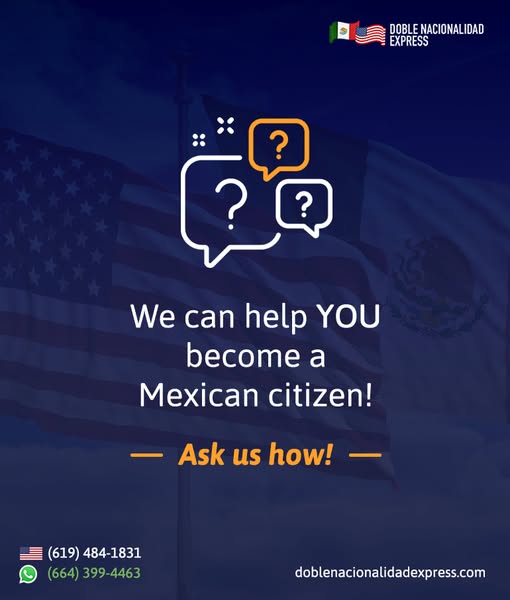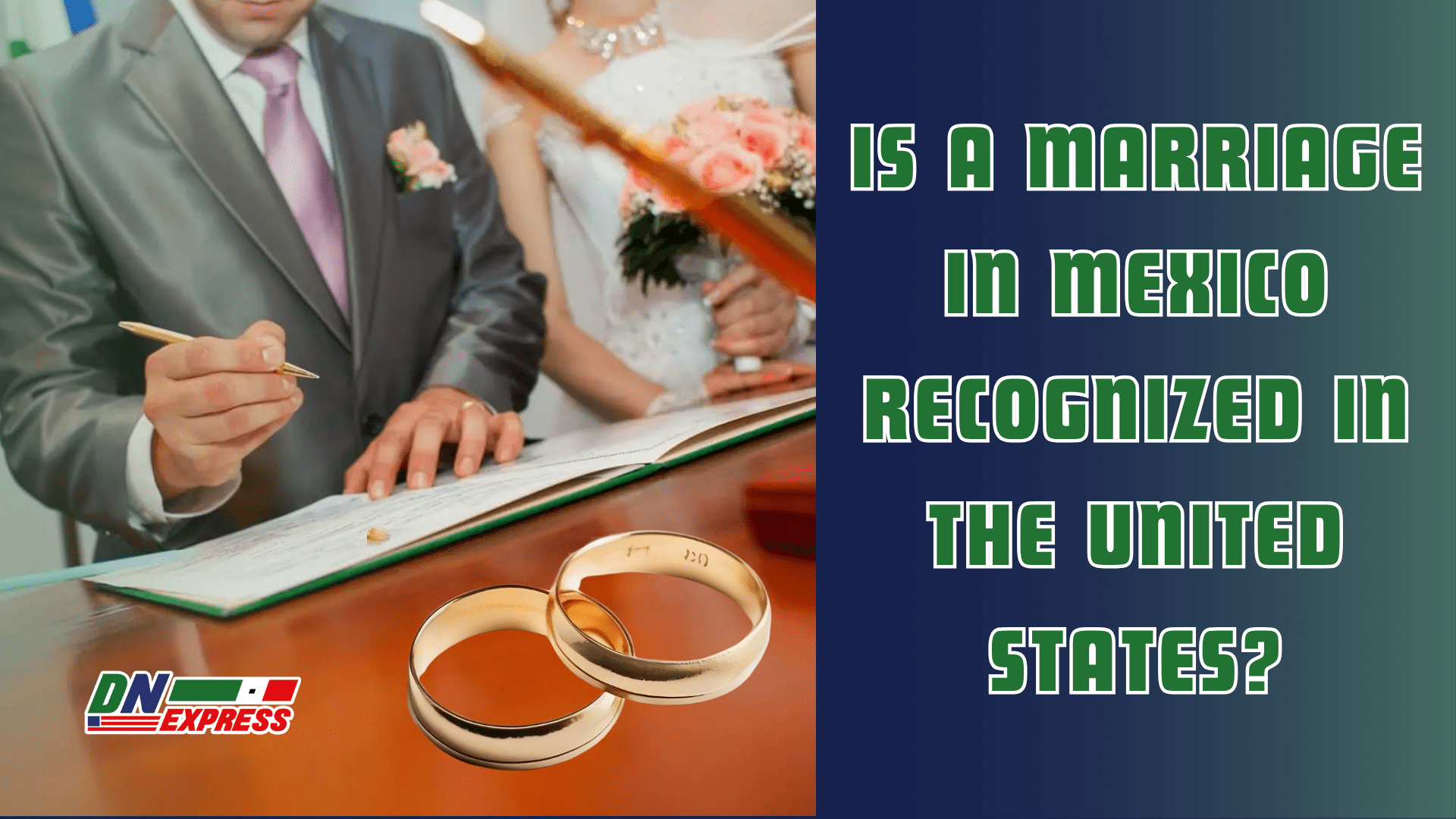
Yes, marriages legally performed in Mexico are recognized in the U.S., provided they follow Mexican civil law. But to use your marriage certificate in the U.S., you may need to apostille and translate it for legal, immigration, or name change purposes.
But there’s more to the story. Whether your marriage affects immigration petitions, Social Security benefits, or name changes depends on how you handle your Mexican documents in the U.S.
This guide explains what’s required and what mistakes to avoid.
We help U.S. and Mexican couples navigate these challenges, handling apostilles, translations, and even correcting marriage records, without setting foot in a consulate.
Ready to dive deeper?
Here's how U.S. law views Mexican marriages, what steps you may need to take, and why having our professional team by your side makes all the difference.

Does U.S. Law Recognize Marriages Abroad?
If your marriage in Mexico was performed by a civil authority and followed local laws, the United States considers it legally valid.
There’s no need to remarry in the U.S., a properly issued Mexican marriage certificate is enough for most legal purposes.
However, it’s important to understand that only civil marriages carry legal weight in Mexico.
Religious ceremonies, while meaningful, are considered symbolic and are not recognized by either the Mexican or U.S. government for official purposes.
This distinction matters when it comes to applying for immigration benefits, changing your name, or adding a spouse to health insurance. If your marriage was civil but your documents are not apostilled and translated, U.S. agencies may still reject them.
In short: as long as your marriage complied with Mexican law, it will be recognized in all U.S. states.
But your next steps depend on how and where you intend to use the certificate.
Why It Matters for These Groups
We understand your Mexican marriage represents love while carrying life-changing legal and cultural implications for you and your family on both sides of the border.
Here’s how it affects different groups of people:
🟢 U.S.-Born Children of Mexican Parents
For many parents, registering their marriage in Mexico simplifies the process of claiming Mexican nationality for their U.S.-born children.
A legally recognized marriage means fewer roadblocks when applying for dual citizenship and obtaining Mexican passports, opening doors to education, travel, and healthcare benefits in Mexico.
🟢 Adults With a Mexican Parent or Grandparent
If your parents or grandparents were married in Mexico, their civil marriage may be a key document when proving your lineage for dual citizenship. It also helps establish your legal standing in Mexico for inheritance rights or property claims.
For families with unregistered marriages, we can help correct the oversight to ensure eligibility remains intact.
🟢 Parents Seeking Mexican Citizenship for U.S.-Born Kids
We've seen consulates deny citizenship applications for children when the parents' marriage lacks proper documentation in Mexico.
A recognized civil marriage eliminates this barrier, ensuring your kids can inherit their Mexican heritage without legal complications.
🟢 Those Rejected by Consulates or Told They’re Ineligible
It’s frequent for people to be turned away after being told their family’s Mexican marriage “doesn’t count” because of missing apostilles or translations. We specialize in tough cases like these, using legal expertise to overturn rejections and give families the second chance they deserve.
🟢 Families Protecting Mexican Property & Inheritance
Whether you’re dealing with a family estate or planning future investments in Mexico, a validated marriage record is crucial.
It helps avoid disputes over property rights and ensures your spouse or children can legally inherit assets across borders.
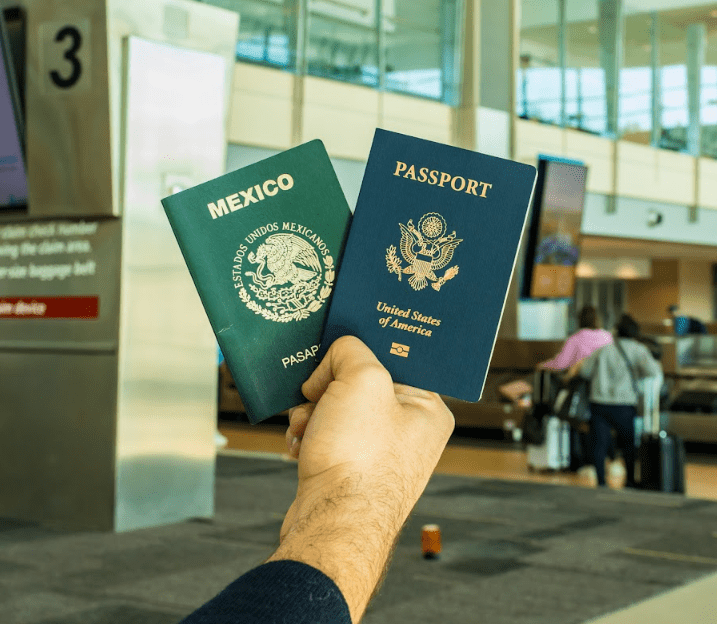
U.S. Requirements After Marrying in Mexico
While your Mexican marriage is recognized in the United States, you may still need to take additional steps to use your marriage certificate for legal purposes like immigration, name changes, or spousal benefits.
Do I Need to Register My Marriage in the U.S.?
There is no federal registry of marriages in the United States. Your Mexican marriage certificate is legally valid as long as it was issued by a civil registry in Mexico.
However, individual U.S. states may ask for your marriage certificate, properly apostilled and translated, when:
- Changing your last name on a driver’s license or Social Security card.
- Adding a spouse to health insurance.
- Filing taxes jointly as a married couple.
Keep in mind that some states have stricter rules, and you may need a court order if your documents aren’t in English or lack an apostille.
For general guidance on marriage recognition across countries, Lawyers.com offers helpful insights.
How Do I Legalize My Mexican Marriage Certificate?
To ensure your Mexican marriage certificate is accepted by U.S. agencies:
- Get an Apostille in Mexico
Request an apostille from the state where your marriage was registered. This official stamp certifies the document for international use. Processing times can vary from 2 to 8 weeks. - Have It Professionally Translated
U.S. authorities require a certified English translation. Be sure to use an accredited translator to avoid rejections. - Submit to U.S. Agencies When Needed
Use the apostilled and translated certificate for name changes, immigration petitions, or any legal processes requiring proof of marriage.
Learn more about Hague Convention member countries and apostille authorities.
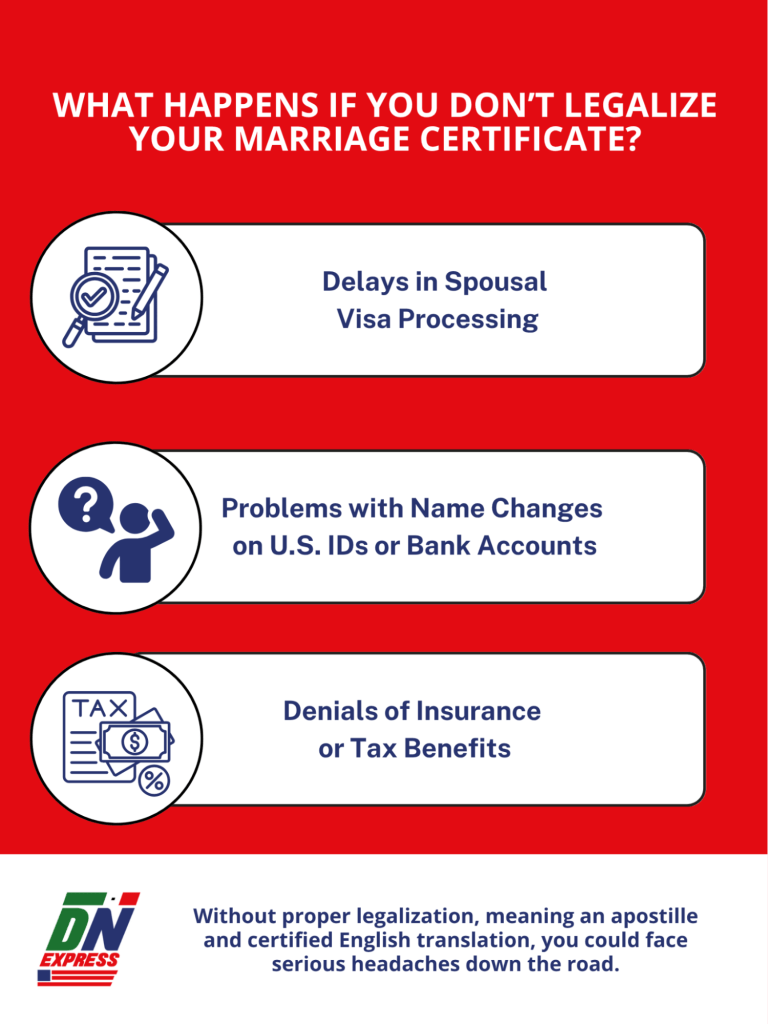
What Happens If You Don’t Legalize Your Marriage Certificate?
We know a Mexican marriage certificate alone won't suffice if you plan to use it in the United States.
Without proper legalization, meaning an apostille and certified English translation, you could face serious headaches down the road.
Potential Issues to Watch For
- Delays in Spousal Visa Processing
USCIS requires proof of a valid marriage. Submitting an uncertified or untranslated Mexican certificate can stall your I-130 petition or even trigger a Request for Evidence (RFE).
- Problems with Name Changes on U.S. IDs or Bank Accounts
Most states won’t accept foreign marriage certificates for driver’s license or Social Security updates unless they’re properly legalized.
Banks may also reject your request to add a spouse to joint accounts.
- Denials of Insurance or Tax Benefits
Employers and the IRS often demand proof of marriage in English.
Without the correct documentation, you could be denied spousal health coverage or lose the ability to file taxes jointly.
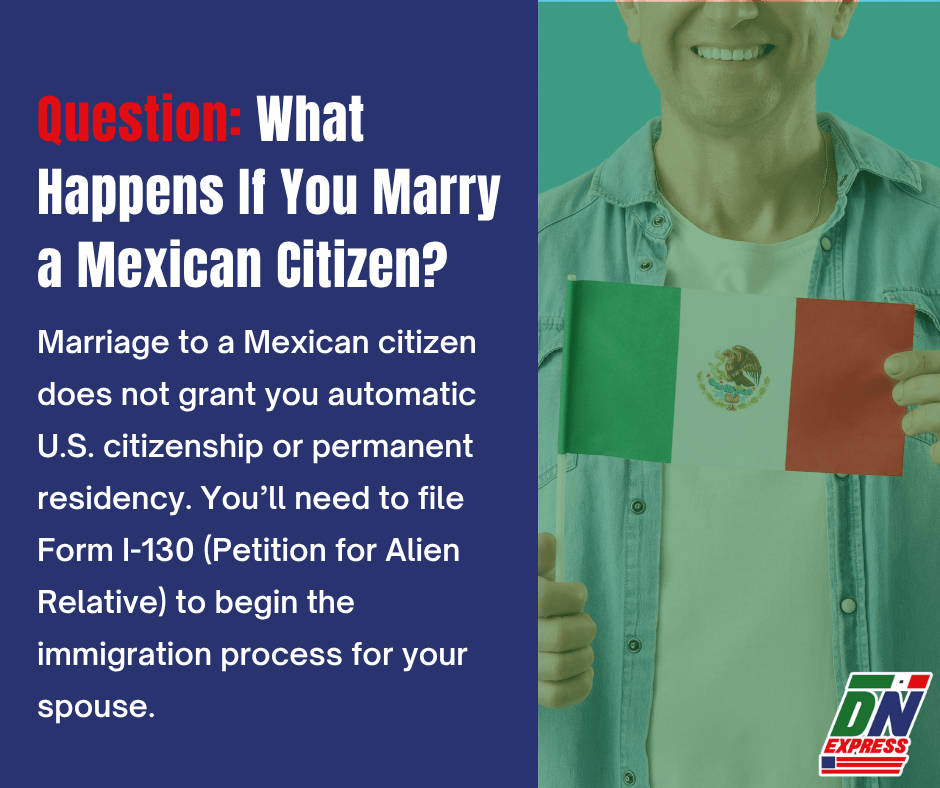
Why DNExpress Is Your Best Ally for Cross-Border Marriages
Handling a Mexican marriage certificate on your own can feel like navigating a maze, two countries, two languages, and endless government paperwork.
That’s where we come in.
We’ve helped thousands of families across California, Texas, Illinois, and beyond legalize their Mexican marriages and secure the rights they deserve on both sides of the border.
Benefits of Working With DNExpress
- No Consulate Visits Needed
Skip the long lines and frustrating appointments. We manage apostilles, certified translations, and even marriage record corrections entirely remotely.
- Licensed Mexican Attorneys
We ensure your case receives comprehensive review and support from professional attorneys licensed in Mexico.
Perfect for tough situations like prior consulate rejections or missing documents.
With nationwide agents across Mexico, we expedite your paperwork while keeping your sensitive documents safe.
- Trusted by Thousands
Even clients who were previously denied by consulates or told “it’s impossible” have succeeded with us by their side.
Downsides of Doing It Yourself
- Weeks (or months) lost to Mexican bureaucracy.
- Risk of misfiled or rejected documents at U.S. agencies.
- Stress and confusion from navigating two legal systems without guidance.
We believe reclaiming your legal rights shouldn’t feel impossible. We make the complex simple, so you and your family can move forward with confidence.
Ready to Legalize Your Marriage and Secure Your Rights?
Your marriage deserves to be recognized, both in Mexico and the United States. Don’t let confusing paperwork or government red tape stand in the way of building your future together.
We handle every step for you, apostilles, certified translations, and even fixing marriage records, all without requiring a single consulate visit.
Schedule a Free Case Review or Message Us on WhatsApp. to Start Your Process
Let us handle the Paperwork, While You Focus on Your Future
Your story continues even when someone tells you “no.” With our guidance, we can help turn it into a “yes.”

Frequently Asked Questions
When it comes to Mexican marriages and U.S. recognition, these are the questions we hear most often from couples navigating life across borders:
-
Do U.S. Courts Recognize Foreign Marriages?
Yes. As long as your marriage was legally performed under Mexican civil law, U.S. courts and agencies recognize it. This applies to immigration cases, tax filings, and even Social Security benefits.
-
What Happens If You Marry a Mexican Citizen?
Marriage to a Mexican citizen does not grant you automatic U.S. citizenship or permanent residency. You’ll need to file Form I-130 (Petition for Alien Relative) to begin the immigration process for your spouse.
-
Do You Need Your Marriage Certificate for a U.S. Passport?
Only if you’re changing your name after marriage. The U.S. Passport Agency requires an apostilled and certified English translation of your Mexican marriage certificate to update your documents.
-
Do You Have to Divorce in the Country You Were Married?
No. If your marriage was legally dissolved under the laws of the country where it took place, U.S. courts will generally honor it. This also applies to Mexican divorces, as long as they were properly filed and finalized.
-
Can You Be Married in Both Countries?
Legally, no. Once married in Mexico, you’re considered married in the U.S. too. However, many couples choose a symbolic U.S. ceremony for family and friends, even though it has no legal effect.
-
How Does USCIS Verify Marriage?
USCIS verifies your marital status using your Mexican civil marriage certificate. It must be apostilled and accompanied by a certified English translation to be accepted during visa or green card processing.
-
How long does it take to apostille a Mexican marriage certificate?
It depends on the Mexican state where your marriage was registered. Processing times can range from 2 to 8 weeks. We can help expedite the process through our network of local agents.
- Is same-sex marriage in Mexico recognized in all U.S. states?
Yes. Since same-sex marriage is legal in Mexico, the U.S. recognizes these marriages nationwide. Your civil marriage certificate must still be apostilled and translated for use with U.S. agencies.
- What documents do I need for a name change post-Mexican marriage?
You’ll need your Mexican marriage certificate (apostilled and translated), valid photo ID, and Social Security card. Some states may also require additional affidavits or a court order if your marriage certificate isn’t in English.
